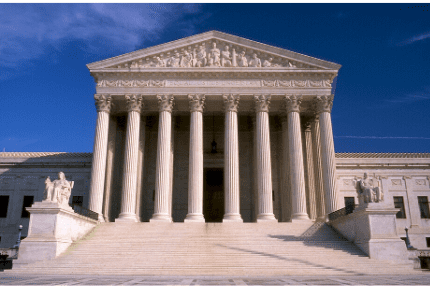
Wild Virginia’s Day at the Supreme Court
by David Sligh
On Monday, February 24th, the U.S. Supreme Court will hear arguments from Wild Virginia and others to decide whether the Forest Service has the legal authority to allow the Atlantic Coast Pipeline (ACP) to cross the Appalachian Trail (AT) on National Forest land. In this blog, I aim to give you some insights about how we got here and what comes next, but there are several facts I want to emphasize right off the bat:
No matter what the court decides in this case, Dominion will still have major hurdles to clear before it can ever finish this pipeline.
We won’t know the court’s opinion tomorrow; it’s likely to be sometime in June before a decision is released. And whatever you hear about Justices’ questions or possible attitudes from the hearing, predictions about the result based on that information are far from reliable.
There continue to be important roles for you to play in the battle to defeat this project once and for all.
Background
Dominion Energy applied to the U.S. Forest Service asking the agency to grant a right of way across both the Monongahela and George Washington National Forests for a pipeline crossing. The Forest Service, after a review process in which many of you submitted public comments, approved ACP’s right of way permit.
Wild Virginia joined six other organizations to challenge the Forest Service decision in the U.S. Court of Appeals for the Fourth Circuit. Our partners in this effort are the Cowpasture River Preservation Association, Highlanders for
Responsible Development, Shenandoah Valley Battlefields Foundation, Shenandoah Valley Network, the Virginia Wilderness Committee, and the Sierra Club making an amazingly strong and diverse set of groups and interests. Attorneys from the Southern Environmental Law Center (SELC) and the Sierra Club have represented the groups in the litigation.
The Fourth Circuit agreed with us that the Forest Service had erred in granting the right of way, because it had not adequately assessed route alternatives or analyzed water quality pollution risks. It also held that the Service lacked the authority to let Dominion cross the Appalachian Trail on the Forest.
Dominion appealed the Fourth Circuit’s decision and the Supreme Court granted the appeal. The Forest Service also supported Dominion’s request to the Supreme Court and filed its own challenge alongside Dominion.
The Legal Question at the Supreme Court
As expressed in our attorneys’ brief, the “question presented” to the Supreme Court is:
Whether the United States Forest Service has statutory authority under the Mineral Leasing Act to grant a gas pipeline right-of-way across the Appalachian National Scenic Trail.
Of course, legal issues are often more complicated than they seem at first. To simplify the disputes, a primary question is whether the AT is “land within the National Park system.”
We argue that it plainly is – the opposition claims otherwise. This is the argument we at Wild Virginia will continue to present to the Supreme Court. Dominion and the government argue that the Appalachian Trail is not “land” but is somehow separate from the land it crosses. They also maintain that, because the Forest Service has responsibilities over this area, that it is not in the Park system.
Tomorrow and Beyond
The attorneys on both sides have submitted their briefs and tomorrow get the chance to present the arguments to the Justices in oral presentations. The Justices will surely have many sharp and detailed questions, in an attempt to sort out the arguments.
Based on the briefs and oral arguments from Wild Virginia and others, the Supreme Court will vote on the case and issue one or more opinions, dissents, etc. We should know the result of all this deliberation and writing at least by the end of June.
As stated at the start of this blog, remember that the Supreme Court’s decision is still just one of numerous steps that still will affect the fate of the ACP.
Even if Dominion wins the decision of the AT crossing the Forest Service must still address the other flaws the Fourth Circuit identified. This means additional analysis by the Service, a new public participation process, and a new final decision. Be assured that, if parties believe the next decision is legally flawed, we will take whatever action is necessary to seek a sound legal resolution.
In addition to the Forest Service approval, ACP also lacks necessary approvals from the Corps of Engineers, the Fish and Wildlife Service, the National Park Service (in regard to the Blue Ridge Parkway), and the Virginia State Air Pollution Control Board.
What Can You Do?
Your continued involvement and support is vital. We will let you know when additional public comments can be submitted to influence any of these agency decisions and help you understand how to effectively contribute. Stay tuned.
Also, join us in urging our U.S. Senators and Representatives to be vigilant and strongly oppose any attempts by Dominion to get a special deal from Congress to cross the AT. Go here and sign our petition.
Finally, we can’t do the work that has helped stop work on both the ACP and MVP without your help. Having you stand with us, as members and supporters, is what gives us the strength to keep up the fight. Learn how to support our work here.